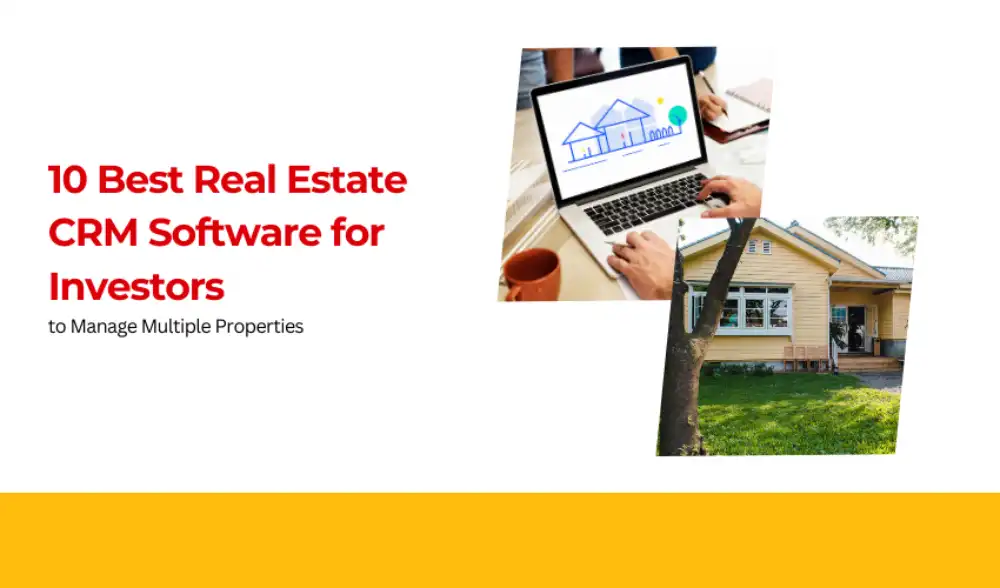10 Best Real Estate CRM Software for Investors to Manage Multiple Properties
Managing a small property portfolio may feel manageable at first. But as your real estate investments grow, so do the challenges. You start juggling multiple leads, tenants, service providers, and internal team members—all while trying to close deals, manage timelines, and track performance.
That is where a real estate CRM designed for investors becomes essential. It allows you to centralize property data and automate follow-ups. It helps you stay on top of every task without getting buried in spreadsheets.
Unlike standard CRMs that only handle basic contact management, investor-focused CRMs offer tools for property tracking, deal flow, and campaign automation.
In this guide, we break down the 10 best CRM software tools built specifically for real estate investors who are managing multiple properties.
What to Look for in a Real Estate CRM for Investors
Before you choose a CRM, it is important to understand the features that truly support real estate investing. Not all platforms offer the tools investors need to manage deals, properties, and teams efficiently. A good CRM for investors should offer:
- Property and deal tracking
- Automation for lead follow-up and task management
- Email/SMS campaigns and drip marketing
- Integrations with QuickBooks, Zapier, Google Workspace, etc.
- Mobile-friendly dashboards
- Scalability for portfolio expansion
Top 10 Real Estate CRM Software for Investors
A Quick Comparison Table
| CRM | Best For | Price | Ideal User |
| REsimpli | Automating & scaling real estate investing | $149+ | Investors looking to scale |
| Lofty CRM | All-in-one investor teams | $399 | Large teams |
| LionDesk | Budget automation | $25 | Solo flippers |
| Realeflow | Deal analysis & marketing | $125 | Flippers, wholesalers |
| InvestorFuse | Follow-up automation | $99 | High-volume users |
| PropStream | Property research | $99 | Data-first investors |
| Salesforce | Advanced custom workflows | $25+ | Enterprise-level teams |
| Zoho CRM | Entry-level real estate CRM | $14 | Beginners |
| HubSpot CRM | Content-based lead funnels | Free | Inbound-focused investors |
| Pipedrive | Simplicity and visual layout | $21 | Solo landlords |
Choosing the right CRM can transform how you operate and grow your real estate investment business. The following CRM solutions offer distinct advantages depending on your goals and team structure.
1. REsimpli
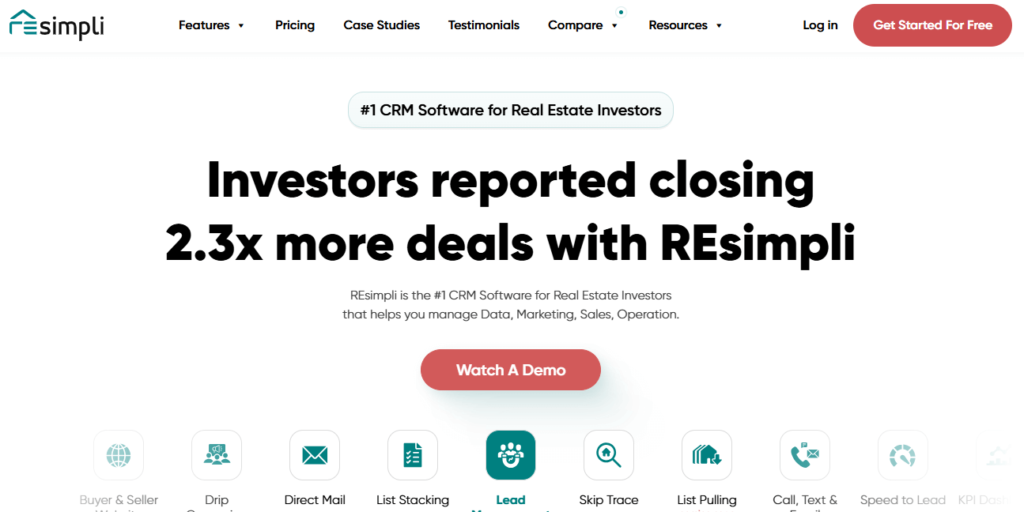
REsimpli is an all-in-one CRM designed specifically for real estate investors. It combines lead management, direct mail, phone, SMS outreach, free skip tracing, and KPI tracking into a single platform. With its investor-focused workflow, REsimpli helps streamline operations, pull off-market properties, and reduce tech stack clutter.
Its 9 built-in AI Agents stand out, instantly handling lead calls, follow-ups, and even grading sales calls automatically. REsimpli serves all purposes, whether you’re a new, growing, or veteran investor, team managing a high volume of leads, or a business looking to scale. Features like the list builder, speed to lead, drip campaign, etc., make this system arguably the best in its field.
Best For: Real estate investors and teams needing automation
Pros: 9 Built-in AI Agents, investor-focused features, eliminates multiple software subscriptions
Cons: Too many features may feel overwhelming
2. Lofty CRM (formerly Chime)
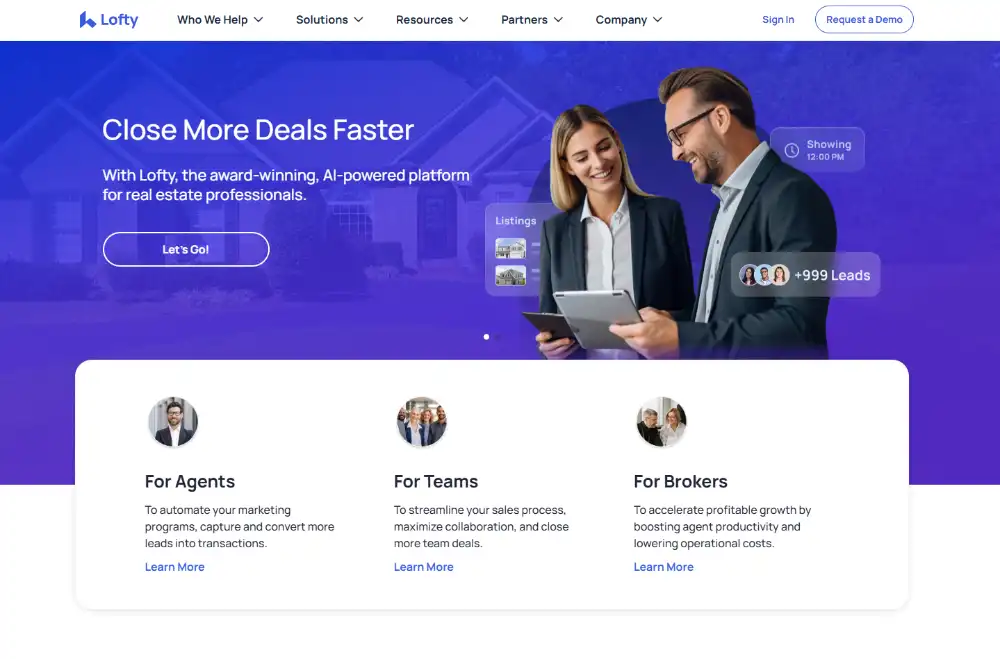
Lofty is an all-in-one CRM and marketing platform tailored to serious real estate professionals and investor teams. It provides advanced tools such as IDX-integrated websites, AI-powered lead scoring, automated follow-up sequences, and dynamic property pipeline management.
The AI assistant handles communication and ensures no opportunity is missed. Lofty also includes built-in ad management and conversion tracking, which is ideal for scaling operations efficiently.
Best For: Growth-focused investors managing a team
Pros: AI automation, IDX support, analytics dashboard
Cons: Premium pricing may not suit beginners ($399/month)
3. LionDesk

LionDesk delivers excellent value for investors who want core CRM features with automation. It supports drip email campaigns. You can also send video texts and log calls directly in the system. These features are essential for building and maintaining strong lead relationships.
The interface is easy to use, even for beginners. It also offers helpful automation without feeling too complex. You can track transactions and client activity, which makes it easier to manage property follow-ups.
Best For: Budget-conscious solo flippers or small teams
Pros: Multi-channel follow-ups, SMS and video messaging
Cons: Basic property tracking; not built for complex portfolios
4. Realeflow
Realeflow is built for investors who buy, rehab, and flip properties regularly. It offers tools for lead generation and deal analysis. You can also estimate rehab costs and automate your marketing tasks.
It includes landing page builders and analysis tools. The platform also supports workflow automation. Together, these features provide the end-to-end support you need to close deals more efficiently.
Best For: Flippers and wholesalers needing analysis tools
Pros: Robust marketing suite, rehab estimator, property insights
Cons: Outdated user interface and limited customization
5. InvestorFuse
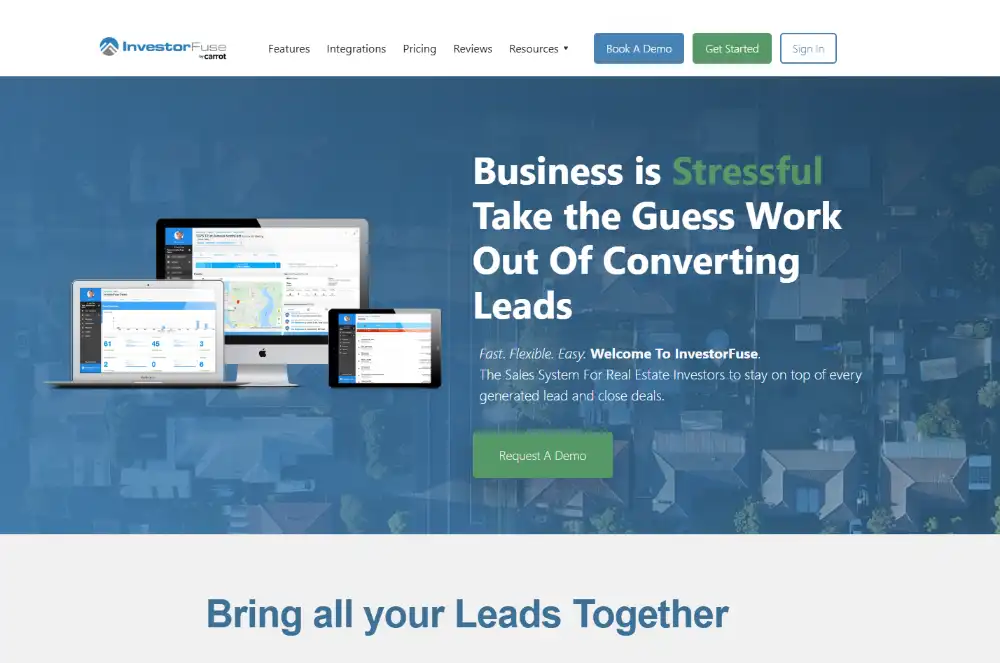
InvestorFuse focuses on improving lead conversion speed through automation. Its action-based lead management system ensures you never miss a follow-up.
Leads are categorized by urgency and routed through a task-driven workflow. The dashboard is minimal and productivity-focused. It helps high-volume investors handle more leads without extra staff.
Best For: Wholesalers and lead-heavy investors
Pros: High-speed lead response, strong automation
Cons: Limited flexibility in layout and customization
6. PropStream
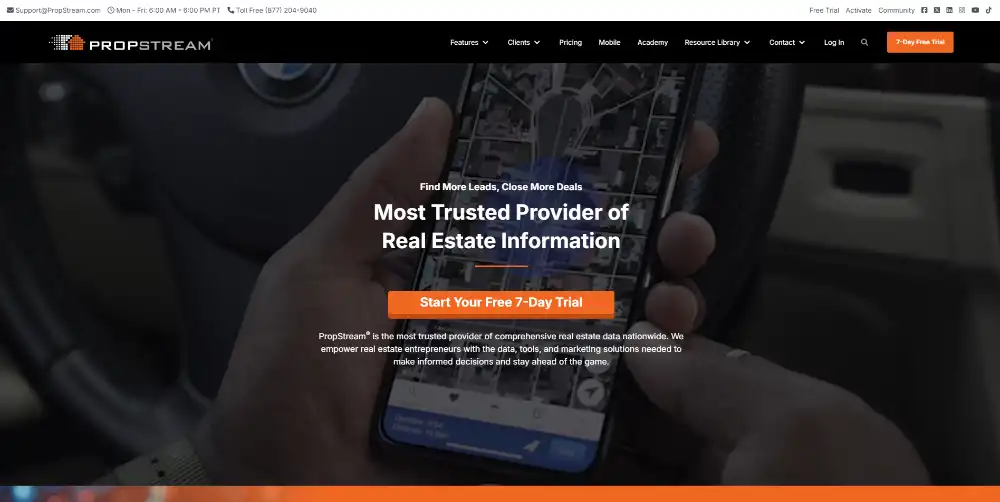
PropStream is more of a data intelligence tool than a traditional CRM. It lets you research properties across the U.S., assess property values using real-time comps, and track ownership history with ease.
The platform also allows you to export leads for outreach. It includes skip tracing, email campaigns, and advanced list filtering. These features make it a top choice for data-driven investors who create their own deal flow.
Best For: Data-driven landlords and lead researchers
Pros: Extensive data access, off-market property tools
Cons: Not a full CRM; limited workflow and deal pipeline features
7. Salesforce with Real Estate Plugins
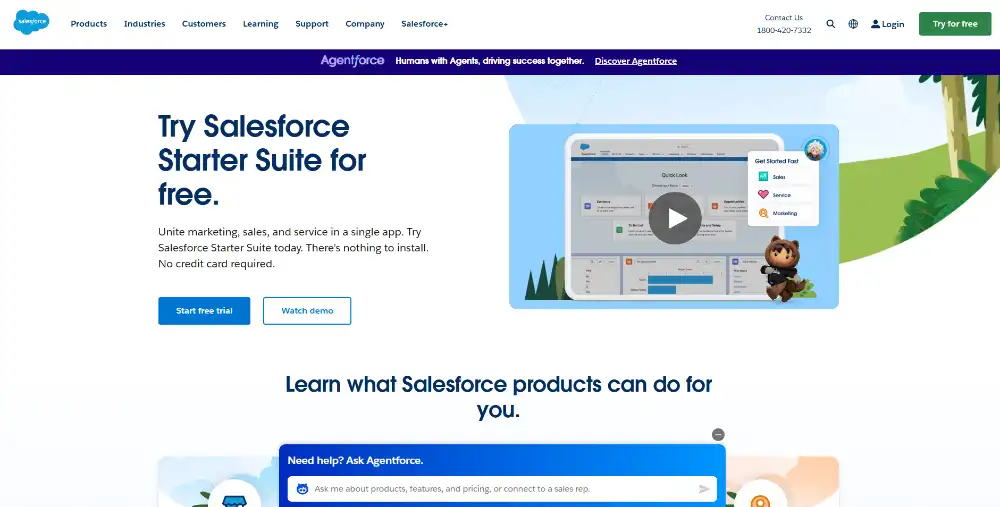
Salesforce is the gold standard for enterprise-level CRM systems. With real estate plugins or custom development, Salesforce becomes a powerful platform. It can handle large property portfolios, multiple teams, and complex transactions with ease.
The system offers deep customization. You can build workflows, create detailed reports, and set up automations that match your specific investment strategy.
Best For: Large-scale investment firms and franchises
Pros: Unlimited scalability, advanced reporting
Cons: Requires technical resources and a higher investment
8. Zoho CRM
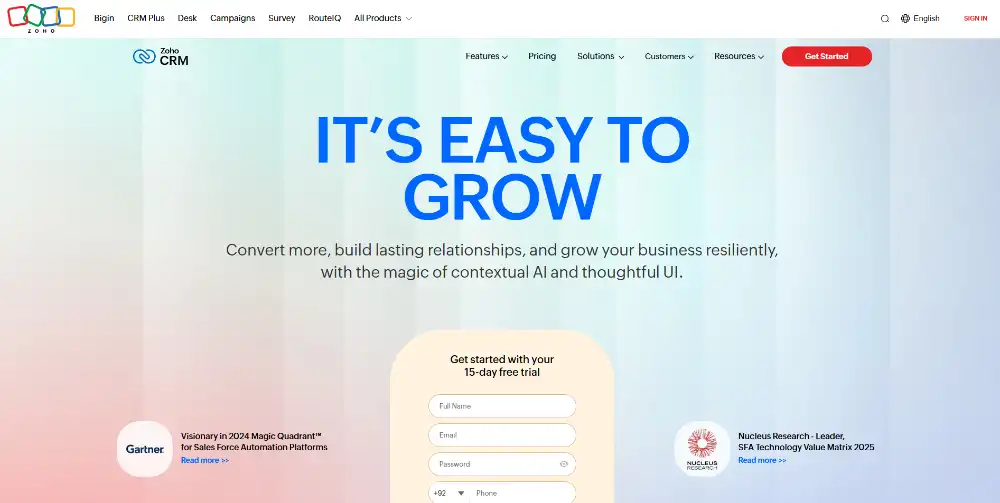
Zoho CRM is an affordable yet capable option for beginner investors. It offers lead tracking, workflow automation, sales pipelines, and email marketing tools. These features cover the basic needs of most new investors.
Although it lacks built-in real estate modules, its flexibility makes it highly adaptable. Its low cost also makes it a wise choice for those just starting out. Zoho integrates easily with Google Workspace, QuickBooks, and many other popular apps.
Best For: New investors and small portfolios
Pros: Budget-friendly, intuitive UI, mobile app
Cons: Lacks built-in real estate functions and deal flow tools
9. HubSpot CRM
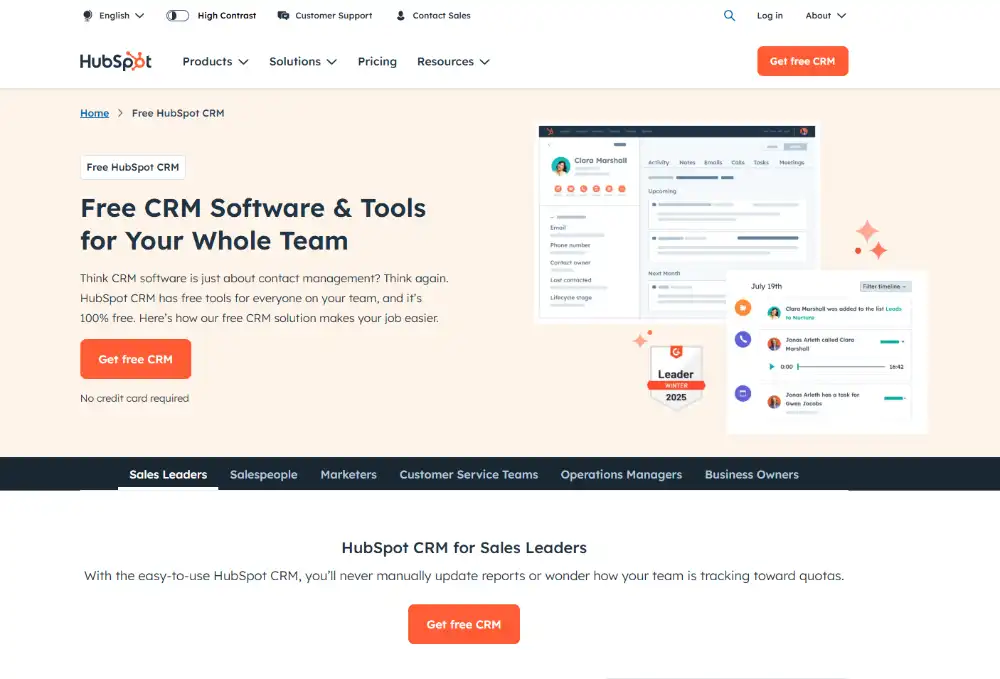
HubSpot offers powerful CRM and marketing tools, even on its free plan. It is particularly strong in content marketing and inbound lead generation. It allows you to track email opens and engagement.
You can also create landing pages and automate lead nurturing without any hassle. It is especially powerful for investors who rely on blogs, SEO, or paid campaigns. If marketing is a key part of your lead generation strategy, HubSpot’s tools are hard to beat.
Best For: Investors focused on inbound or content marketing
Pros: Free starter tier, powerful marketing stack
Cons: Real estate tools require integrations; advanced features get expensive
10. Pipedrive
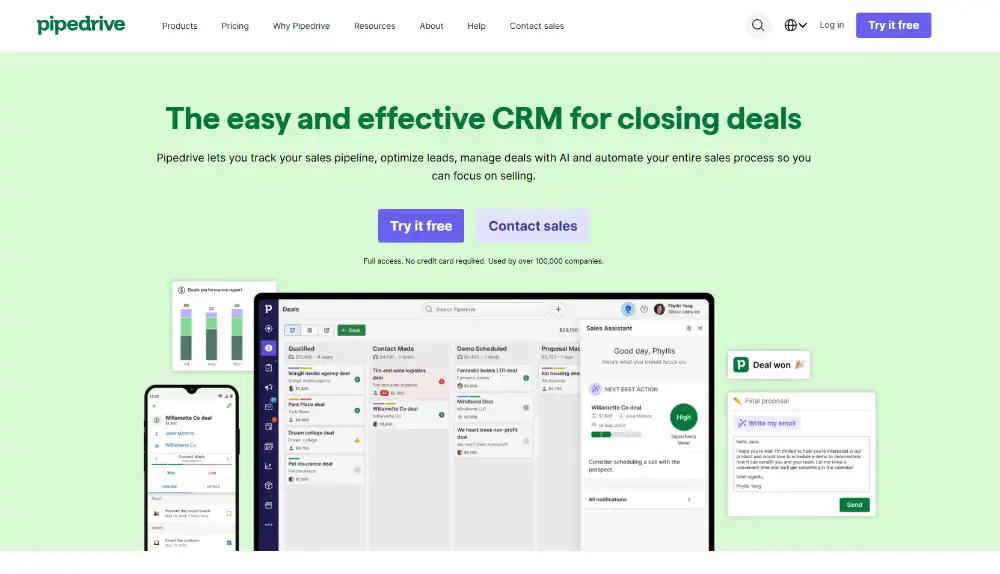
Pipedrive uses a drag-and-drop interface that helps you visualize every stage of your sales or deal pipeline. It is great for solo landlords or small teams who want simplicity and clarity in deal tracking. You can set follow-up reminders, attach documents, and integrate third-party tools for additional functionality.
Best For: Visual learners and landlords who value simplicity
Pros: Clean UI, fast setup, customizable stages
Cons: Must be tailored to real estate; lacks native property fields
Final Thoughts
Do not pick a CRM just because it is popular. Choose one that fits your workflow, team size, and growth stage. If you are just starting out, begin with a budget-friendly tool like Zoho or Pipedrive. For more complex portfolios, consider Lofty or Podio.
Always test the software through demos or free trials. The right CRM should feel intuitive, save time, and bring order to your growing investments.

